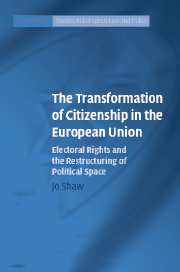 The Transformation of Citizenship in the European Union
The Transformation of Citizenship in the European Union Book contents
- Frontmatter
- Dedication
- Contents
- List of figures
- List of tables
- Preface and acknowledgments
- PART I Electoral rights in legal and political context
- 1 Introduction: electoral rights and the boundaries of the suffrage
- 2 Political membership in and beyond the state
- 3 Electoral rights for non-nationals: theoretical, legal and political accounts
- PART II The past, present and future of EU electoral rights
- PART III The contestation of electoral rights in the Member States of the European Union
- PART IV Conclusions
- Bibliography
- Index
1 - Introduction: electoral rights and the boundaries of the suffrage
from PART I - Electoral rights in legal and political context
Published online by Cambridge University Press: 05 June 2015
- Frontmatter
- Dedication
- Contents
- List of figures
- List of tables
- Preface and acknowledgments
- PART I Electoral rights in legal and political context
- 1 Introduction: electoral rights and the boundaries of the suffrage
- 2 Political membership in and beyond the state
- 3 Electoral rights for non-nationals: theoretical, legal and political accounts
- PART II The past, present and future of EU electoral rights
- PART III The contestation of electoral rights in the Member States of the European Union
- PART IV Conclusions
- Bibliography
- Index
Summary
This book explores some of the relationships between the contested concepts and practices of citizenship and membership, of nation and nationality, and of states and ‘state-like’ polities, such as the European Union. Its frame of reference is the EU and its Member States, and its primary prism of analysis is the concept of citizenship. To illuminate these relationships, the book uses the case of electoral rights for non- nationals, or ‘aliens’ as they are still sometimes anachronistically called. That is, it looks at the cases where non-nationals, i.e. those who, without the formal nationality of the state where they reside, are permitted to vote (and indeed to stand) in elections in the host state. These are most often local elections, or, in the special case of the EU, European Parliament elections; occasionally, non-nationals are permitted to vote or stand in national or ‘regional’ elections (that is, elections to the devolved or ‘state’-level authorities in Member States which have federal or devolved systems of government). In addition, the book also looks at many cases where non-nationals are denied those same rights, on the premise that the denial of rights is often as illuminating as the granting of them.
The extension of electoral rights beyond the boundaries of national citizenship is almost always a highly contested political and legal move, although a recent opinion poll highlights that, despite generally negative attitudes towards foreigners and immigrants within the Member States, there are often positive attitudes amongst citizens to the proposition that non-nationals who pay taxes should also enjoy the right to vote in local elections. Indeed, the suggestion that EU citizens should have the right to vote in all elections organised in the Member State in which they live, regardless of national citizenship, came in third place when respondents in a Eurobarometer survey were asked to nominate (from a list) which two measures they thought offered the best ways of strengthening European citizenship.
- Type
- Chapter
- Information
- The Transformation of Citizenship in the European UnionElectoral Rights and the Restructuring of Political Space, pp. 3 - 17Publisher: Cambridge University PressPrint publication year: 2007


